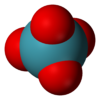Xenon tetroxide
|
|
|||
| Names | |||
|---|---|---|---|
|
IUPAC names
Xenon tetraoxide
Xenon(VIII) oxide |
|||
| Other names
Xenon tetroxide
Perxenic anhydride |
|||
| Identifiers | |||
|
3D model (Jmol)
|
|||
| ChemSpider | |||
|
|||
|
|||
| Properties | |||
| XeO4 | |||
| Molar mass | 195.29 g mol−1 | ||
| Appearance | Yellow solid below −36°C | ||
| Density | ? g cm−3, solid | ||
| Melting point | −35.9 °C (−32.6 °F; 237.2 K) | ||
| Boiling point | 0 °C (32 °F; 273 K) | ||
| Structure | |||
| Tetrahedral | |||
| 0 D | |||
| Thermochemistry | |||
|
Std molar
entropy (S |
? J.K−1.mol−1 | ||
|
Std enthalpy of
formation (ΔfH |
+153.5 kcal mol−1 | ||
| Hazards | |||
|
EU classification (DSD)
|
Explosive (E) | ||
| Related compounds | |||
|
Related compounds
|
Perxenic acid Xenon trioxide |
||
|
Except where otherwise noted, data are given for materials in their standard state (at 25 °C [77 °F], 100 kPa).
|
|||
|
|
|||
| Infobox references | |||
Xenon tetroxide is a chemical compound of xenon and oxygen with molecular formula XeO4, remarkable for being a relatively stable compound of a noble gas. It is a yellow crystalline solid that is stable below −35.9 °C; above that temperature it is very prone to exploding and decomposing into elemental xenon and oxygen (O2).
All eight valence electrons of xenon are involved in the bonds with the oxygen, and the oxidation state of the xenon atom is +8. Oxygen is the only element that can bring xenon up to its highest oxidation state; even fluorine can only give XeF6 (+6). Two other short-lived xenon compounds with an oxidation state of +8, XeO3F2 and XeO2F4, are accessible by the reaction of xenon tetroxide with xenon hexafluoride. XeO3F2 and XeO2F4 can be detected with mass spectrometry. The perxenates are also compounds where xenon has the +8 oxidation state.
At temperatures above −35.9 °C, xenon tetroxide is very prone to explosion, decomposing into xenon gas and oxygen with ΔH = −643 kJ/mol:
Xenon tetroxide dissolves in water to form perxenic acid and in alkalis to form perxenate salts:
Xenon tetroxide can also react with xenon hexafluoride to give xenon oxyfluorides:
All syntheses start from the perxenates, which are accessible from the xenates through two methods. One is the disproportionation of xenates to perxenates and xenon:
...
Wikipedia


